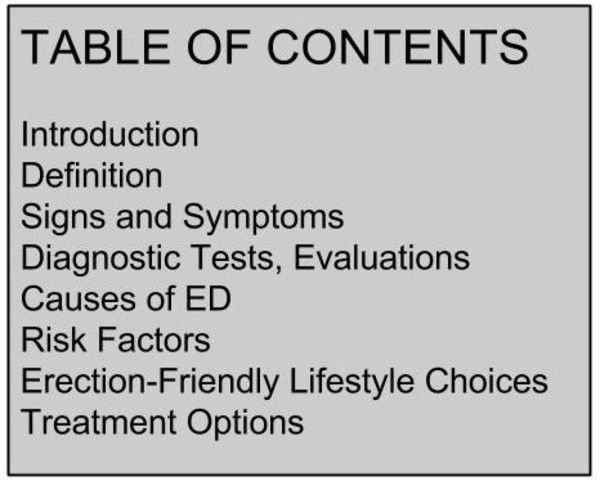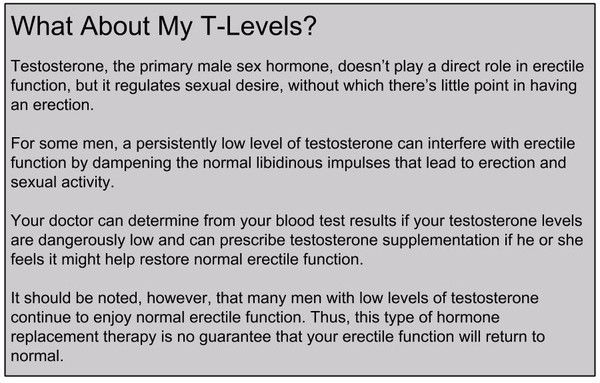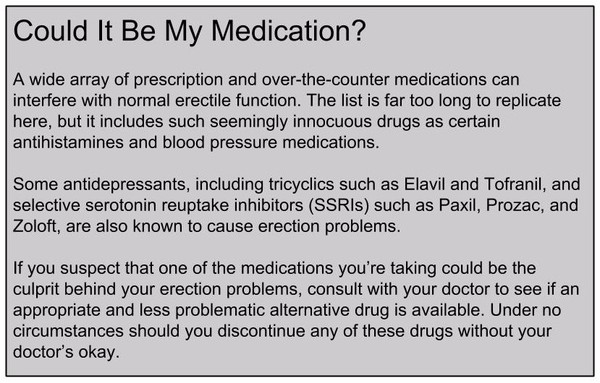
ED or Not ED? An Older Man's Guide to Spotting Erectile Dysfunction
Is it really erectile dysfunction? Or are you simply having temporary erection problems because of a fleeting problem that soon will pass? Your doctor can help you find the answer.

Introduction
Few things are as distressing to men as an inability to get and keep an erection strong and long-lasting enough for sexual activity. However, occasional difficulty in getting an erection is not necessarily a sign that erectile dysfunction -- also known as impotence -- is just around the corner.
Although erection problems are alarming to men of all ages, they are particularly worrisome to older men, among whom the incidence of ED is highest. However, ED is not an inevitable consequence of aging, and it is not always easy to differentiate between occasional problems and full-blown ED. Hopefully, the information presented here will help to clear up some of that confusion.
Definition
Erectile dysfunction is defined as a persistent "inability to achieve or maintain an erection sufficient for satisfactory sexual performance," according to a consensus statement accepted by the National Institutes of Health in the early 1990s. That NIH statement recommended that the less precise diagnosis of "impotence" be replaced by "erectile dysfunction," which more accurately describes the nature of the problem.
The key word here is "persistent," which hopefully will relieve the anxieties of men who occasionally experience erection difficulties but have not yet seen a persistent pattern that would lead them to believe a chronic problem exists.
Signs and Symptoms
Although the NIH-approved definition of ED seems fairly clear, men should be alert for the development of continuing and worsening difficulties in getting and keeping an erection. Some men may find that they are still able to get an erection fairly easily but can no longer maintain the erection long enough to complete sexual activity. Others may find that they can't get an erection at all or that the erections they do achieve are not firm enough to allow penetration. Other men may experience a significant decline in sexual desire, which makes it less likely that they will -- or even want to -- achieve an erection.
When such symptoms persist, men should consult with their family doctor about the problem. Your doctor is likely to question you about these symptoms and may also inquire about other health issues that could be contributing to your symptoms of ED. In many cases, no diagnostic tests need be ordered to diagnose ED. However, if the doctor is still in doubt after your discussion, he may order some tests to confirm whether a diagnosis of ED is appropriate.
Diagnostic Tests, Evaluations
As previously noted, a discussion with your doctor may be all that's needed to confirm a diagnosis of erectile dysfunction. However, if the doctor is uncertain about the cause of your impotence, he may order tests to both confirm the diagnosis of ED and to better pinpoint its cause. According to MayoClinic.org, such tests may include:
- Blood Test: Samples of your blood may be sent to a local laboratory to check for markers that indicate the presence of heart disease, diabetes, low testosterone levels, or other conditions linked to ED.
- Physical Exam: A thorough physical examination may be necessary to rule out any physical injury or malformation that could be causing erection problems.
- Psychological Exam: While the vast majority of ED is physiological in origin, it's estimated that psychological issues, such as depression or anxiety, account for 10 to 20 percent of all ED cases.
- Urinalysis: Laboratory evaluation of your urine sample may reveal the presence of underlying conditions that could be causing or at least contributing to your erection difficulties.
- Ultrasound Examination: This test offers medical professionals a closer look at blood flow within the penis, an insufficiency of which is by far the most common cause of ED.
- Overnight Erection Test: By placing a breakable band around the shaft of your penis before you go to bed, it can be determined whether you're experiencing the nocturnal erections that are a normal phenomenon of male sexual function. If you are experiencing such erections, these test results, together with your psychological exam, may lead to a diagnosis of ED that is psychological in origin.
Causes of ED
_600x.jpg)
Atherosclerosis, the gradual buildup of fatty plaque on the inside walls of arteries, can lead to erectile dysfunction.
As previously noted, insufficient blood flow to the penis is by far the most common cause of ED. However, the causes of compromised blood flow to the penis can be traced to a number of underlying health conditions, as well as unhealthy lifestyle choices, which will be covered in greater detail later in this article.

Psychological factors account for as much as 20 percent of all ED cases. For most men with ED of psychological origin, the popular oral ED medications such as Viagra and Cialis are unlikely to do much good. Working out your psychological problems, whether they be performance anxiety, depression, or some other emotional or mental problem, with a qualified professional is probably your best avenue for recovery of normal erectile function.
In rare cases, traumatic injury to the pelvic region or congenital physical defects may interfere with or prevent normal erectile function. Depending on the precise nature of such injuries or malformations, surgical intervention may be required to remedy the problem.
Some ascribe erection problems to "manopause", a condition also known as andropause and male menopause. This is a condition that is experienced by men somewhere between the ages of 40 and 65 and is characterized by changes in hormone production.
Risk Factors
If you have an underlying medical condition that restricts blood flow throughout the body, you are far more likely to experience erection problems than men who have no such disorders. Among the medical conditions associated with an increased risk of ED are atherosclerosis, a condition characterized by a buildup of fatty plaques on artery walls; heart disease; high blood pressure; and elevated levels of low-density lipoprotein, the so-called bad cholesterol. Also at high risk of ED are men who suffer from metabolic syndrome, a condition that combines a quartet of increased risk factors: high blood pressure, high blood sugar, excess fat around the waist, and abnormal cholesterol levels.

Other medical conditions that can increase your risk of ED include obesity, Parkinson's disease, multiple sclerosis, sleep disorders, and Peyronie's disease, a buildup of scar tissue within the penis. Unhealthy lifestyle choices such as smoking, heavy alcohol consumption, and other forms of substance abuse also increase a man's risk of ED.
Psychological barriers to normal erectile function include depression, anxiety, or other mental health conditions; stress; and relationship problems, which can arise due to poor communications or stress.
Erection-Friendly Lifestyle Choices

Regular exercise can help to keep erectile dysfunction at bay.
If your doctor finds that you are suffering from early symptoms of ED or if you are at increased risk of developing ED, certain healthy lifestyle choices can minimize the severity of your ED and in some milder cases may even reverse its symptoms altogether. Here, courtesy of WebMD.com, are a handful of suggestions about lifestyle choices that can turn things around for you:
- Eat a heart-healthy diet: A diet high in fruits and vegetables and low in high-fat meats and processed foods can help to improve your cardiovascular health, which in turn can reduce your erection problems. The Mediterranean diet is widely recommended as an appetizing way to improve cardiovascular health and function.
- Exercise regularly: A regular program of physical activity can improve cardiovascular health and erectile function, which are closely connected. If you've been largely sedentary up until now, you might want to get started by walking a mile or two per day and gradually increasing the length and pace of your walks.
- Shed Those Extra Pounds: If you're seriously overweight or even obese, you must realize that the extra weight you're carrying around puts a severe strain on cardiovascular function. The heart must work extra hard to pump enough blood to supply your oversized body, and in time, the effects will begin to show, primarily in the form of diminished blood flow and the damage that can cause.
- Bring Down High Blood Pressure and Cholesterol: As you've already seen, elevated blood pressure and cholesterol (particularly bad cholesterol) can lead to erection problems, as well as diminished cardiovascular function. If your doctor tells you that either or both your blood pressure and cholesterol levels are out of line, follow his advice to correct these problems as soon as possible.
- Stop Smoking: Smoking compromises your health on multiple levels, but if nothing else convinces you to kick the habit, perhaps the damage it can do to erectile function will cause you to take some action.
- Minimize Alcohol Consumption: A cocktail or a glass or two of wine can set the mood for romance, but too much can sabotage things. If you must drink, try to limit your intake to one or two at most.
Treatment Options
If the worst happens and your doctor tells you that you're suffering from erectile dysfunction, you have several treatment options. These include the popular oral impotence drugs, including Viagra, Cialis, Levitra, Staxyn, and Stendra. Other options include penile injection therapy, vacuum pumps to produce erections, herbal remedies, and a dizzying array of new treatments that are popping up in the news and online with increasing frequency. Among the new-fangled approaches to ED treatment are a quick-acting mouth spray and pork sausages with erection-friendly herbal ingredients. Yet another treatment for ED that's been getting a lot of press lately is the use of sound waves to improve erectile function.
If you'd like to stay abreast of the latest developments on the consumer health front, check out our blog.

















































































